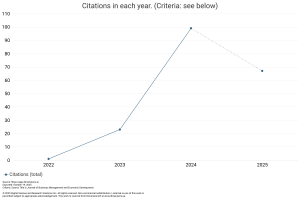Lifestyle Dynamics and Purchasing Pattern Transformation: Significant Shifts in Indonesian Society Post-Pandemic
DOI:
https://doi.org/10.59653/jbmed.v2i02.621Keywords:
Post-Pandemic Consumer Shifts, Digital Adoption and Consumption, Wellness and Sustainability Priorities, Experiences Over PossessionsAbstract
The COVID-19 pandemic has deeply impacted Indonesia, leaving lasting effects on both public health and societal norms. Beyond mere statistics, the transformation touches every aspect of life, altering how Indonesians work, live, and connect with the world. Accelerated digital adoption, increased health consciousness, and a shift in priorities have significantly reshaped the consumer landscape. E-commerce platforms have boomed, serving as virtual marketplaces for various needs. A holistic approach to well-being emerged, with a focus on organic foods, fitness, and mindfulness. Environmental concerns spurred a demand for sustainable products. The allure of material possessions diminished, replaced by a desire for meaningful experiences and personal growth. This intricate tapestry reveals a post-pandemic Indonesia emphasizing technology, health, sustainability, and a redefined pursuit of happiness. Businesses and policymakers must comprehend these shifts to adapt strategies for the evolving consumer, fostering responsible consumption and contributing to a better Indonesia.
Downloads
References
BPS. (2023). The Impact of COVID-19 on Consumer Behavior and E-Commerce Development in Indonesia. 1–144.
COVID-19 National Task Force. (2020). COVID-19 National Task Force to Coordinate with Regional Governments on ‘New Normal’ Implementation.
Dhiman, H., Verma, V., Singh, L. R., Miglani, V., Jha, D. K., Sanyal, P., Tandon, S. K., & Prasad, G. V. R. (2023). New Late Cretaceous titanosaur sauropod dinosaur egg clutches from lower Narmada valley, India: Palaeobiology and taphonomy. PLOS ONE, 18(1), e0278242.
Flatters, P., & Willmott, M. (2009). Understanding the Post-Recession Consumer. Harvard Business Review, 87, 106-+.
McKinsey & Company. (2023). The Post-Pandemic Consumer in Indonesia: Shifting Priorities and Opportunities for Growth.
NielsenIQ. (2023). Indonesia E-commerce Report 2023: A Landscape Transformed.
Setiawan, A., & Yuwono, A. (2022). The Rise of Digital Lifestyles in Post-Pandemic Indonesia: A Case Study of Online Entertainment and Education. Journal of Media and Cultural Studies, 34(2), 123–145.
Solomon, M. (2016). Consumer Behavior: Buying, Having, and Being. Pearson; 12th edition (January 14, 2016).
Statista. (2023). Indonesia: Trends in Health and Wellness.
Sufa, S. A., Christantyawati, N., & Jusnita, R. A. E. (2017). Healthy Lifestyle Trends and Pattern Actor Communication Channels Eat Food Combining. Jurnal Komunikasi Profesional, 1(2), 105–120. https://doi.org/10.25139/jkp.v1i2.473
Valaskova, K., Kramarova, K., & Bartosova, V. (2015). Multi Criteria Models Used in Slovak Consumer Market for Business Decision Making. Procedia Economics and Finance, 26, 174–182. https://doi.org/https://doi.org/10.1016/S2212-5671(15)00913-2
Downloads
Published
How to Cite
Issue
Section
License
Copyright (c) 2024 Muchamad Bachtiar , Kemas A. Rachman Panji, Siska Armawati Sufa, Sabila Zata Amani , Ayulina Mayangsari

This work is licensed under a Creative Commons Attribution-ShareAlike 4.0 International License.
Authors who publish with this journal agree to the following terms:
- Authors retain copyright and grant the journal right of first publication with the work simultaneously licensed under a Creative Commons Attribution-ShareAlike that allows others to share the work with an acknowledgement of the work's authorship and initial publication in this journal.
- Authors are able to enter into separate, additional contractual arrangements for the non-exclusive distribution of the journal's published version of the work (e.g., post it to an institutional repository or publish it in a book), with an acknowledgement of its initial publication in this journal.
- Authors are permitted and encouraged to post their work online (e.g., in institutional repositories or on their website) prior to and during the submission process, as it can lead to productive exchanges, as well as earlier and greater citation of published work (See The Effect of Open Access).





























